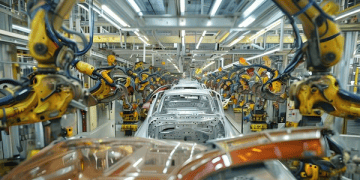Austen Goolsbee, President of the Chicago Federal Reserve, spoke at the 31st annual automotive insights symposium at the bank’s Detroit branch on Wednesday. His address centered on the economy’s supply-side dynamics, focusing on the ongoing effects of supply chain disruptions and their impact on inflation.
Goolsbee discussed how supply chains, once largely overlooked by economists, became a critical issue following disruptions caused by the Covid-19 pandemic in 2020. He noted that the lessons learned from these disruptions could influence future monetary policy decisions. Goolsbee also pointed to the unusual economic trends observed over the past five years, such as rising inflation amid high unemployment in 2021 and an unexpected decrease in inflation by 2023.
In his remarks, Goolsbee emphasized that supply chain disruptions played a significant role in driving inflation over the last several years. Drawing comparisons to the 2008 financial crisis, he noted that similar to that period, central banks and economists had to quickly integrate new challenges into their economic frameworks.
The Chicago Fed President shared three key lessons from the pandemic: that supply chains are more specialized and fragile than anticipated, supply-side problems can affect other markets and may take longer to resolve, and supply-side disruptions can significantly influence overall inflation.
Looking ahead to 2025, Goolsbee acknowledged that while the economy remains strong and supply chains have largely recovered, new challenges are emerging. These include natural disasters, geopolitical factors, immigration issues, and potential changes in tariffs that could influence the supply chain.
Goolsbee cautioned against underestimating the complexities of the supply chain when evaluating the potential impact of tariffs on inflation. He highlighted that nearly half of U.S. imports are intermediate goods, meaning that tariffs on these goods could increase production costs for domestic manufacturers.
As for the Federal Reserve’s role in 2025, Goolsbee outlined the importance of distinguishing whether rising inflation is caused by economic overheating or by tariffs. This distinction will be critical in determining when or if the Fed should take action. He also called for greater collaboration between economic experts, business leaders, and industry professionals to better understand and address these challenges.
In closing, Goolsbee commended the Chicago Fed’s Research Department for its expertise in industrial organization and productivity, stressing the importance of continued industry collaboration to navigate supply-side challenges in the year ahead.
Find the best supply chain logistics news at The Supply Chain Report. Free international trade tools are available at ADAMftd.com.
#SupplyChainChallenges #EconomicInsights #InflationTrends #FederalReserve #IndustryCollaboration















